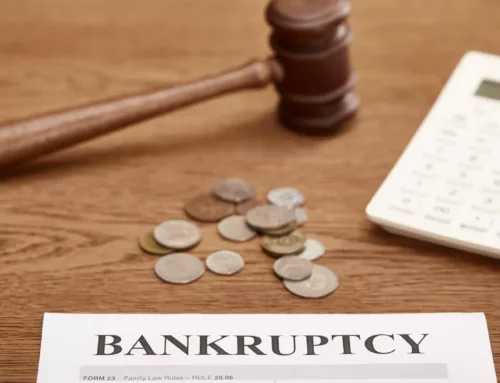Learn Effective Ways to Stop Property or Asset Garnishment in Bankruptcy
Property and asset garnishment can be a distressing experience, especially for individuals facing financial challenges in Royal Oak, Michigan. When struggling with overwhelming debts, bankruptcy can provide a legal solution to obtain a fresh start. However, understanding the ways to stop property or asset garnishment in bankruptcy proceedings is crucial for protecting one’s assets and regaining financial stability.
Hammerschmidt Stickradt & Associates, a Royal Oak bankruptcy law firm, offers comprehensive solutions to stop property or asset garnishment during bankruptcy proceedings. Their deep understanding of bankruptcy law and strategic approach can provide clients with effective legal strategies and negotiation techniques to protect their properties and assets from garnishment, ensuring a smoother financial recovery.
Whether you are considering filing for bankruptcy or are already in the process, this guide will equip you with valuable information to help you make informed decisions and protect your property and assets in Royal Oak, Michigan.
What is Garnishment?
Garnishment is a legal process through which a creditor obtains a court order to collect a debt by seizing a portion of a debtor’s property or assets. The purpose of garnishment is to satisfy the debt owed to the creditor by diverting funds directly from the debtor’s income, bank accounts, or other assets.
Typically, garnishment occurs after a creditor has obtained a judgment against the debtor in a court of law. Once the court approves the garnishment order, the creditor can initiate the process of seizing the debtor’s property or assets to satisfy the debt. The seized funds or property are then applied towards repaying the outstanding debt, including any interest, fees, or penalties.
Garnishment can affect various types of assets, including wages, bank accounts, rental income, and even personal property. It is important to note that garnishment laws and regulations can vary depending on the jurisdiction, and specific exemptions may exist to protect certain types of property from seizure.
Understanding the purpose and implications of garnishment is crucial for individuals facing financial difficulties and seeking ways to stop or mitigate its impact, particularly in bankruptcy proceedings.
What are the Types of Property and Assets That Can Be Garnished?
Several types of property and assets can potentially be subject to garnishment, depending on the laws and regulations of a particular jurisdiction. Here are some common examples:
- Wages and Salary: One of the most common forms of garnishment is the garnishment of an individual’s wages or salary. A portion of the debtor’s income can be withheld directly from their paycheck to satisfy the debt.
- Bank Accounts: If a creditor obtains a garnishment order, they can seize funds from the debtor’s bank accounts, including checking, savings, or investment accounts.
- Rental Income: If the debtor receives rental income from properties they own, creditors may garnish those rental payments to satisfy outstanding debts.
- Tax Refunds: In some cases, creditors can intercept a debtor’s tax refunds and apply them towards the owed debt.
- Personal Property: Depending on the jurisdiction, certain personal property, such as vehicles, real estate, or valuable assets, may be subject to garnishment to satisfy the debt.
- Retirement Accounts: Although retirement accounts like 401(k)s and IRAs are generally protected from creditors outside of bankruptcy proceedings, they may still be vulnerable to garnishment under specific circumstances.
It’s important to note that exemptions and protections for certain types of property may exist under state or federal laws. These exemptions can vary, so consulting with a bankruptcy attorney or researching specific laws applicable to your jurisdiction is crucial to understanding which assets may be exempt from garnishment.
What are the Ways to Stop Property or Asset Garnishment in Bankruptcy?
Ways to stop property or asset garnishment in bankruptcy in Royal Oak, Michigan include:
Automatic Stay Provision
The automatic stay provision is a fundamental aspect of bankruptcy law that provides immediate legal protection to debtors upon filing for bankruptcy. It is designed to offer relief and breathing space by halting almost all collection actions, including property or asset garnishment, initiated by creditors.
Key points about the automatic stay provision include:
- Immediate Protection: As soon as you file for bankruptcy, the automatic stay goes into effect, putting a temporary hold on all collection efforts against you. This means that creditors must cease any ongoing garnishment proceedings or actions to seize your property or assets.
- Notice to Creditors: Once the automatic stay is in effect, the bankruptcy court will notify your creditors about your bankruptcy filing. Creditors are legally obligated to comply with the stay and must redirect any further collection efforts towards the bankruptcy proceedings.
- Violations of the Automatic Stay: If a creditor continues to pursue collection actions in violation of the automatic stay, you have the right to take legal action against them. Your bankruptcy attorney can assist you in enforcing the automatic stay and seeking appropriate remedies for violations.
The automatic stay provision is a powerful tool that provides debtors with immediate relief from property or asset garnishment and other collection activities. It is essential to understand its implications, consult with a bankruptcy attorney, and ensure compliance to fully benefit from the protections it offers during the bankruptcy process.
Exempt Property in Bankruptcy
Exempt property in bankruptcy refers to certain assets that are protected from being liquidated or seized to satisfy the debts owed by a debtor. These exemptions vary depending on federal bankruptcy laws and the specific exemption statutes of the state where the bankruptcy is filed, such as Michigan in this case.
Here are key points about exempt property in bankruptcy:
- Purpose of Exemptions: Exemptions serve as a safeguard to ensure that debtors can maintain a basic standard of living and retain essential assets while going through the bankruptcy process. They provide a fresh start by allowing debtors to keep specific property needed for their ongoing life and work.
- Federal and State Exemptions: Bankruptcy law provides for two sets of exemptions that debtors can choose from: federal exemptions outlined in the Bankruptcy Code and state exemptions available under each state’s laws. In Michigan, debtors can choose between the federal exemptions and Michigan’s state-specific exemptions.
- Common Exempt Assets: Exempt property can include various types of assets, such as:
-
- Homestead: A portion of the equity in your primary residence may be exempt.
- Personal Property: This can include items such as clothing, furniture, appliances, and other household goods up to a certain value.
- Motor Vehicles: There are usually exemptions for one or more vehicles, often up to a specific value.
- Retirement Accounts: Certain retirement accounts, such as 401(k)s, IRAs, and pensions, may be exempt.
- Tools of Trade: Tools, equipment, or materials necessary for your occupation or profession may be protected.
- Public Benefits: Exemptions may apply to government benefits, such as Social Security, unemployment benefits, and public assistance.
- Life Insurance: The cash value of life insurance policies may be exempt up to a certain amount.
- Wildcard Exemption: Some exemptions allow debtors to protect a certain amount of value in any property they choose.
It’s important to note that exemptions can be complex, and their application can vary depending on individual circumstances and the bankruptcy chapter filed. Seeking guidance from a knowledgeable bankruptcy attorney will help you navigate the exemptions and protect your assets effectively during the bankruptcy process in Royal Oak, Michigan.
Negotiating with Creditors
Negotiating with creditors is a potential strategy to stop or modify property or asset garnishment in bankruptcy. Here are key steps to consider when negotiating with creditors:
- Assess Your Financial Situation: Before entering into negotiations, evaluate your financial circumstances, including your income, expenses, and available resources. Understanding your overall financial picture will help you determine the feasibility of reaching a negotiated agreement with your creditors.
- Open Communication: Establish open lines of communication with your creditors. Contact them to explain your current financial difficulties and your intention to resolve the debt through negotiation. Be prepared to provide them with relevant financial information or documentation to support your claims.
- Understand Your Options: Familiarize yourself with the various negotiation options available. These may include:
-
-
- Debt Settlement: Offer to settle the debt by proposing a lump sum payment that is less than the total amount owed. Creditors may be willing to accept a reduced payment to resolve the debt.
- Repayment Plan: Propose a revised repayment plan that better aligns with your financial capabilities. This may involve lower monthly payments or extended repayment terms to make the debt more manageable.
- Interest Rate Reduction: Request a reduction in the interest rate or the elimination of any additional fees or penalties associated with the debt. Lowering the overall cost of the debt can make repayment more affordable.
-
- Seek Professional Assistance: Consider working with a reputable credit counseling agency or a bankruptcy attorney who can provide guidance and negotiate with creditors on your behalf. These professionals have experience in dealing with creditors and can help you navigate the negotiation process effectively.
- Document Everything: Keep detailed records of all communications and agreements with creditors. This includes saving copies of written correspondence, making notes of phone conversations, and documenting any agreements reached. Having a clear record of the negotiation process can protect your rights and interests if any disputes arise later.
- Get Agreements in Writing: If you reach a negotiated agreement with a creditor, ensure that you obtain the terms in writing. The written agreement should outline the revised terms of repayment, settlement amounts, or any other modifications. This helps avoid misunderstandings and provides legal protection for both parties.
Financial Counseling and Budgeting
Financial counseling and budgeting are valuable tools that can help individuals regain control of their finances, improve their financial well-being, and prevent future financial difficulties. Here are key points to consider when seeking financial counseling and engaging in budgeting:
- Find a Reputable Financial Counselor: Look for a reputable financial counseling agency or counselor who is trusted to provide guidance and support in managing personal finances. Ensure they have appropriate certifications and a track record of helping individuals with similar financial challenges.
- Assess Your Financial Situation: Take stock of your financial situation by gathering information about your income, expenses, debts, assets, and financial goals. Understand where your money is going and identify areas where you can make adjustments.
- Create a Budget: Develop a budget that aligns with your financial goals. A budget helps you track your income and expenses, prioritize your spending, and allocate funds towards debt repayment, savings, and essential expenses. Consider using budgeting tools or apps to simplify the process and monitor your progress.
- Review and Reduce Expenses: Review your expenses to identify areas where you can cut back or reduce unnecessary spending. This might involve reevaluating subscription services, finding cheaper alternatives for utilities, groceries, or entertainment, and eliminating non-essential expenses.
- Debt Management Strategies: If you have significant debt, work with your financial counselor to develop a debt management strategy. This may involve creating a debt repayment plan, exploring debt consolidation options, negotiating with creditors, or considering bankruptcy if appropriate.
- Savings and Emergency Fund: Establish a savings plan and prioritize building an emergency fund. Setting aside funds for unexpected expenses provides a safety net and reduces reliance on credit in times of financial hardship.
- Financial Education and Resources: Take advantage of financial education resources provided by your financial counselor or other reputable sources. Educate yourself on topics such as budgeting, credit management, savings strategies, and investment options to make informed financial decisions.
Financial counseling and budgeting are ongoing processes that require commitment and discipline. Working with a knowledgeable financial counselor provides personalized guidance, helps you stay accountable, and offers valuable strategies to improve your financial situation. Remember, small steps taken consistently can lead to significant financial progress over time.
Seeking Legal Assistance
Seeking legal assistance is a crucial step when facing property or asset garnishment in bankruptcy or any other legal matter. Here are key points to consider when seeking legal assistance:
- Choose the Right Attorney: Look for an attorney who specializes in bankruptcy law and has experience handling cases related to property or asset garnishment. Consider their expertise, reputation, and track record in successfully representing clients in similar situations.
- Consultation: Schedule an initial consultation with the attorney to discuss your specific circumstances. This meeting allows you to explain your situation, ask questions, and understand the attorney’s approach and recommendations. Use this opportunity to assess their communication style, expertise, and compatibility with your needs.
- Document Preparation: A bankruptcy attorney can assist you in preparing and filing the necessary legal documents accurately and timely. This ensures compliance with the court’s requirements and maximizes the protection of your rights during the bankruptcy process.
- Negotiation and Representation: If negotiation with creditors becomes necessary, an attorney can represent your interests, negotiate on your behalf, and seek favorable outcomes. They can navigate complex negotiations, address legal challenges, and work towards resolving disputes or modifying garnishment terms.
Learn Ways to Stop Property or Asset Garnishment in Bankruptcy With Our MI Law Firm!
The ways for stopping property or asset garnishment in bankruptcy requires a strategic approach and the guidance of a skilled attorney. Understanding the automatic stay provision, asserting exemption claims, negotiating with creditors, and seeking professional legal assistance are essential steps in protecting your assets and achieving financial relief.
If you are facing property or asset garnishment in Royal Oak, Michigan, we encourage you to reach out to Hammerschmidt Stickradt & Associates. With their knowledge of bankruptcy law and a strong track record of helping clients in similar situations, they can provide the personalized legal advice and representation you need.
Don’t face property or asset garnishment alone. Reach out to Hammerschmidt Stickradt & Associates today and let their experienced legal team assist you in navigating the complex bankruptcy process in Royal Oak, Michigan.



